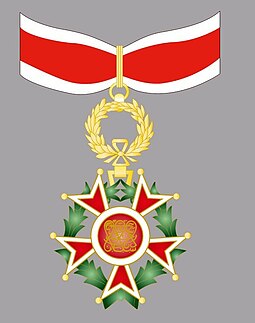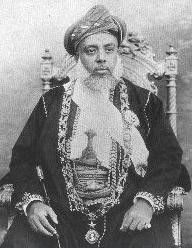
Sayyid Sir Hamoud bin Mohammed Al-Busaidi, GCSI, was the 7th Sultan of Zanzibar.
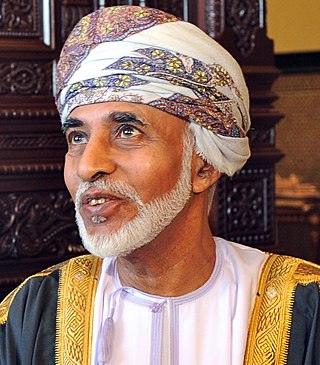
Qaboos bin Said Al Said was Sultan of Oman from 23 July 1970 until his death in 2020. A fifteenth-generation descendant of the founder of the House of Al Said, he was the longest-serving leader in the Middle East and Arab world at the time of his death, having ruled for almost half a century.

The Order of the Dannebrog is a Danish order of chivalry instituted in 1671 by Christian V. Until 1808, membership in the Order was limited to fifty members of noble or royal rank, who formed a single class known as White Knights to distinguish them from the Blue Knights who were members of the Order of the Elephant. In 1808, the Order was reformed and divided into four classes. The statute of the Order was amended in 1951 by a Royal Ordinance so that both men and women could be members of the Order. Today, the Order of the Dannebrog is a means of honouring and rewarding the faithful servants of the modern Danish state for meritorious civil or military service, for a particular contribution to the arts, sciences or business life, or for working for Danish interests.

Sir Khalifa II bin Harub Al-Busaidi was the ninth Sultan of Zanzibar from 9 December 1911 to 9 October 1960.
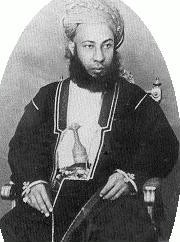
Sayyid Hamad bin Thuwaini Al-Busaidi was the fifth Sultan of Zanzibar. He ruled Zanzibar from 5 March 1893 to 25 August 1896.

Sayyid Khalid bin Barghash Al-Busa'id was the sixth Sultan of Zanzibar.

Sultan Jamshid bin Abdullah Al Busaidi is a Zanzibari royal who was the last reigning Sultan of Zanzibar. He was deposed in the 1964 Zanzibar Revolution, after the United Kingdom gave up its British Protectorate.
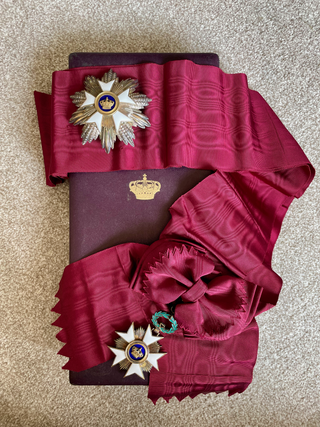
The Order of the Crown is a national order of the Kingdom of Belgium. The Order is one of Belgium's highest honors.

Faisal bin Turki, GCIE, historic spelling Fessul bin Turkee, ruled as Sultan of Muscat and Oman from 4 June 1888 to 4 October 1913. He succeeded his father Turki bin Said as Sultan. Upon his death in 1913, he was succeeded by his eldest son Taimur bin Faisal.

The Order of the White Lion is the highest order of the Czech Republic. It continues a Czechoslovak order of the same name created in 1922 as an award for foreigners. It was inspired by the Czech Nobility Cross created in 1814 by the Emperor and King Francis II and awarded to 37 Bohemian noblemen.

The Anglo-Zanzibar War was a military conflict fought between the United Kingdom and the Sultanate of Zanzibar on 27 August 1896. The conflict lasted between 38 and 45 minutes, marking it as the shortest recorded war in history. The immediate cause of the war was the suspicious death of the pro-British Sultan Hamad bin Thuwaini on 25 August 1896 and the subsequent succession of Sultan Khalid bin Barghash. The British authorities preferred Hamoud bin Mohammed, who was more favourable to British interests, as sultan. The agreement of 14 June 1890, instituting a British protectorate over Zanzibar, specified that a candidate for accession to the sultanate should obtain the permission of the British consul; Khalid had not fulfilled this requirement. The British considered this a casus belli and sent an ultimatum to Khalid demanding that he order his forces to stand down and leave the palace. In response, Khalid called up his palace guard and barricaded himself inside the palace.
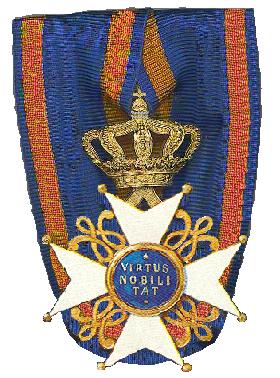
The Order of the Lion of the Netherlands, also known as the Order of the Netherlands Lion is a Dutch order of chivalry founded by King Willem I of the Netherlands on 29 September 1815.

The Imperial Order of Saint Anna was a Holstein ducal and then Russian imperial order of chivalry. It was established by Karl Friedrich, Duke of Holstein-Gottorp, on 14 February 1735, in honour of his wife Anna Petrovna, daughter of Peter the Great of Russia.
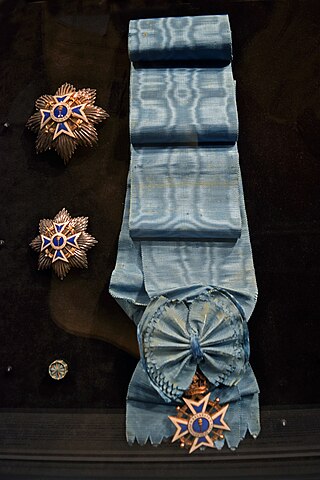
The Royal Order of Kalākaua I was instituted on 28 September 1874 by King Kalākaua I to commemorate his accession to the throne of the Kingdom of Hawaiʻi on 12 February 1874.

Sir Lloyd William Mathews, was a British naval officer, politician and abolitionist. Mathews joined the Royal Navy as a cadet at the age of 13 and progressed through the ranks to lieutenant. He was involved with the Third Anglo-Ashanti War of 1873–4, afterwards being stationed in East Africa for the suppression of the slave trade. In 1877 he was seconded from the navy to Sultan Barghash of Zanzibar in order to form a European-style army; he would remain in the employment of the government of Zanzibar for the rest of his life. His army quickly reached 6,300 men and was used in several expeditions to suppress the slave trade and rebellions against the Zanzibar government.
The Order of Military Merit is a Moroccan military award founded in 1910 by Sultan Mulay Abdelhafid, and reconstituted under its present name in 1976 by King Hassan II. It is awarded for eminent and meritorious military services. There are five classes - Grand Cordon, and First to Fourth Class - each limited to a stated number of recipients.
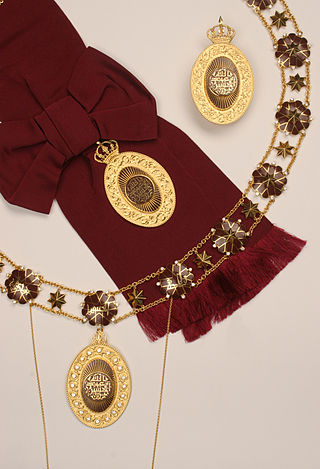
The Order of al-Hussein bin Ali is the highest order of the Kingdom of Jordan. It was founded on 22 June 1949 with one class by King Abdullah I of Jordan with the intended recipients being foreign heads of state and senior royals.
The following is the orders, decorations, and medals given by the sultan of Terengganu. When applicable, post-nominal letters and non-hereditary titles are indicated.
The following is the orders, decorations, and medals given by Sultan of Kelantan. When applicable, post-nominal letters and non-hereditary titles are indicated.


